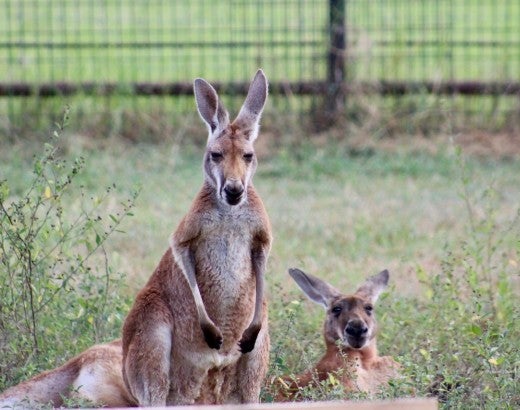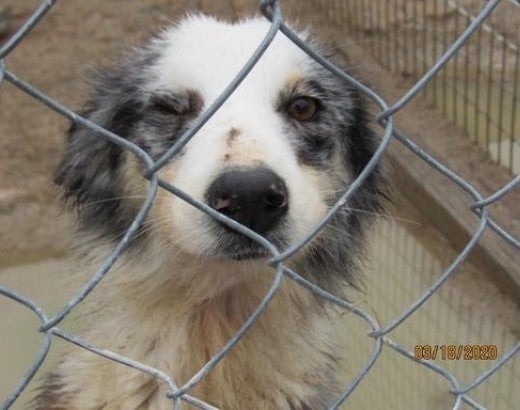The freeze in Texas this month turned up a surprise for authorities in Bexar County as they scrambled to get people and pets out of harm’s way: a tiger cub wearing a harness and living as a “pet” outdoors. A neighbor had reported what sounded like a crying tiger. When they came upon Elsa --- as the sheriff’s office named the cub after a character in the movie “Frozen” --- she was freezing in the Arctic temperatures.
Yesterday, Elsa made a six-hour trip from Bexar County to her new home, our Cleveland Amory Black Beauty Ranch in Murchison, Texas, where she will be able to live out the rest of her life not as a pet but as the wild animal that she is.
This morning, Noelle Almrud, director of Black Beauty Ranch, went live on Facebook to give the world the first glimpse of Elsa settling in. The cub, who at six months and 60 pounds is barely larger than a golden retriever, frolicked energetically in the ranch’s quarantine habitat where she will remain for a month while Noelle and her team assess her and run medical tests to ensure her well-being. “She is just a little spitfire,” Noelle said.
Elsa appears to be in relatively good health despite the ordeal she has endured since her birth in captivity, but she also shows some signs of the stress she has been under: she is missing fur on the top of her head, probably from rubbing against the small cage she was confined to, and her fur is worn down where the harness rubbed against her body.

At the Black Beauty Ranch, once her evaluation is complete and she is a little bigger, Elsa will be moved to a spacious, multi-acre enclosure with trees, woods, platforms to climb and areas to sun herself, similar to what other resident tigers at the ranch enjoy. Among them is Loki, who was rescued two years ago from a cage in an abandoned garage in Houston where he was sitting on rotting meat, mold, maggots and his own waste.
There are 800 residents at the Black Beauty Ranch, a 1,400-acre state-of-the-art sanctuary created for animals who have endured suffering of the worst kind. The animals here belong to over 40 species, and at the ranch they are safe and nurtured and well cared for. The team's dedication to their well-being was in full evidence during the recent deep freeze and power outages. Noelle and her team had planned ahead and were well-prepared with back-up heating sources, generators, propane and other winter supplies. Some staff members couldn't make it to work because roads were not cleared of ice/snow but some essential staff had stayed on the property (for as long as six nights in a row), and did hourly temperature checks on the animals, including non-human primates, reptiles and avian species, who required the supplemental heat to survive. Thanks to their efforts, the animals made it through the catastrophic event unscathed.
We are happy that Elsa is now in such good hands and that we are able to give her a forever home. But it is also important that we work toward the day when no tigers are born to suffer in the pet trade and at the hands of irresponsible people who have no idea how to care for a wild animal. Each year, in the United States, countless tigers and other exotic animals are bred for the pet trade and are readily available to anyone who wants to buy one. There is no federal law or regulation determining who can possess big cats or other dangerous wild animals.
Black Beauty Ranch, along with the Humane Society of the United States, is a founding member of the Big Cat Sanctuary Alliance, an association of more than 20 reputable sanctuaries and partner organizations working to end the exploitation of big cats. The HSUS and the Humane Society Legislative Fund are also working to secure passage of the Big Cat Public Safety Act in Congress, which would ban the possession of big cat species like tigers and lions by unqualified individuals and prohibit their exploitation by facilities that allow public contact with big cats.
The bill passed the House in the last Congress with a wide majority of members voting for it, and it has been reintroduced in the House this Congress.
At Black Beauty Ranch, caregivers will not physically interact with Elsa; they will do positive reinforcement training through the fence. The only other interactions will be for basic medical procedures and disaster preparedness and response, Noelle says. “Our goal for Elsa is to grow up to be a happy, healthy, well-adjusted wild tiger…she will not be played with, she will not be handled by humans. She will be respected for the wild animal she is.”
Sara Amundson is president of the Humane Society Legislative Fund.



